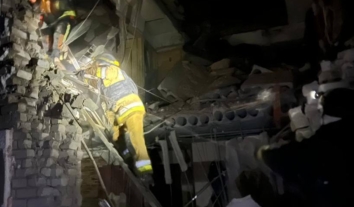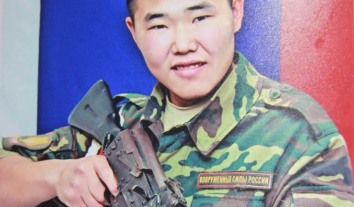How Russian missile strikes crippled Ukraine’s healthcare system – report by Physicians for Human Rights and Truth Hounds
Joint research by Physicians for Human Rights (“PHR”) and Truth Hounds (“TH”) reveals the consequences of Russian attacks on Ukraine’s energy infrastructure, documenting how systematic strikes have reduced available power capacity by 85% and severely compromised healthcare delivery in the country.
The authors of the report pointed out before the full-scale invasion by Russia in February 2022, Ukraine boasted one of the most developed power sectors in Europe, with universal access to electricity. However, by June 2024, available capacity had plummeted by 85 percent due to Russia’s systematic attacks on energy infrastructure. Russia seized assets, launched cyberattacks, and, since October 2022, systematically bombed Ukraine’s energy infrastructure. By September 2024, Russia had allegedly destroyed all thermal power plants and nearly all large hydroelectric power plants.
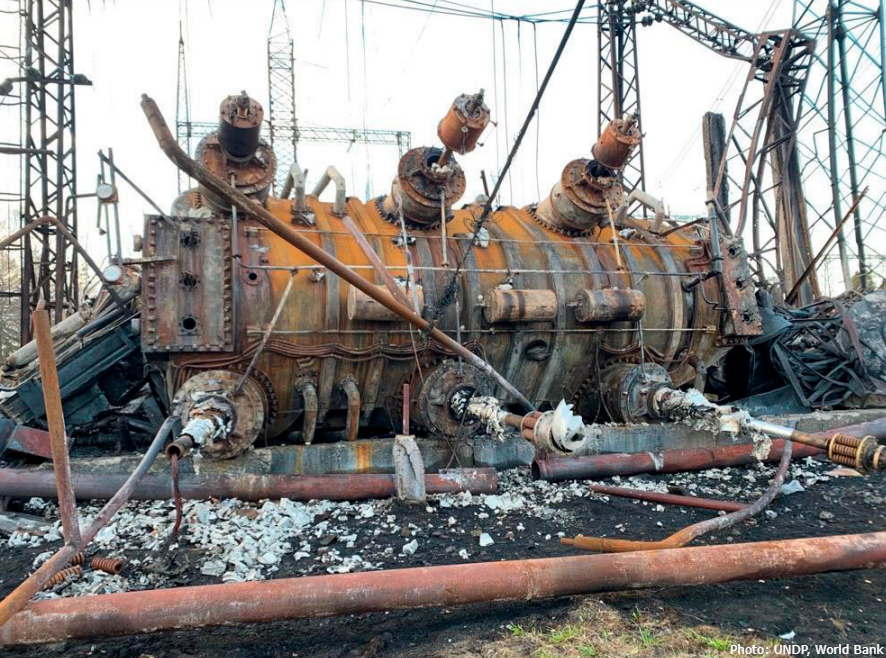 Completely destroyed 330kV 200M VA auto-transformer
Completely destroyed 330kV 200M VA auto-transformerAs recognized by the United Nations Human Rights Monitoring Mission in Ukraine (UN HRMMU) and the United Nations Independent International Commission of Inquiry on Ukraine, attacks on energy have had devastating impacts on the health sector in Ukraine.
Human rights organisations highlight that despite clear protections for health and energy infrastructure in conflict under international law, both sectors have been targeted by Russiaі .
Through research surveying over 2,200 health care workers in Ukraine and case studies, Health Care in the Dark: The Impacts of Russian Attacks on Energy in Ukraine establishes patterns of how energy disruptions translate into short- and long-term health harms and how these harms may be considered violations of international law.
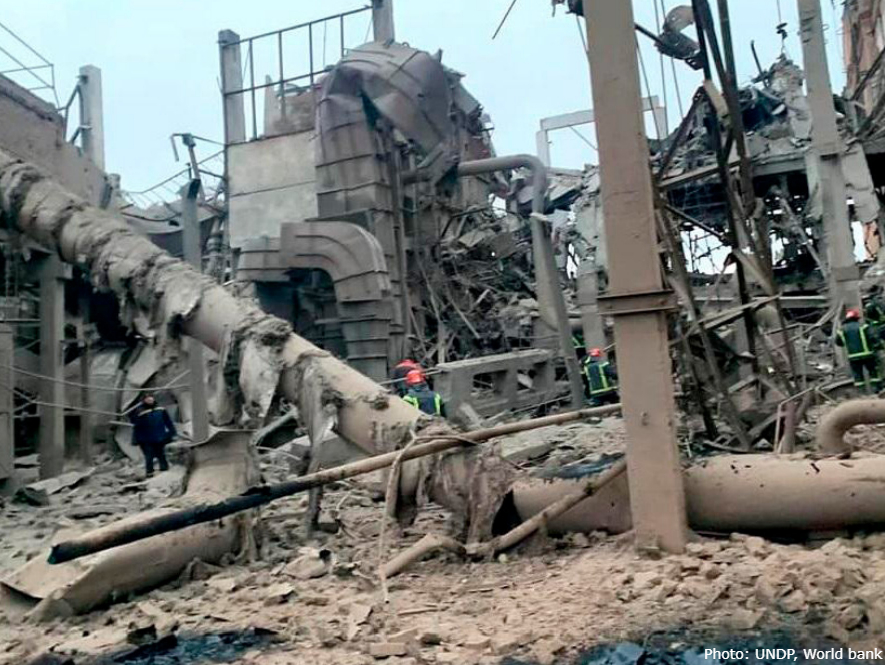 Completely destroyed combined heat and power plant
Completely destroyed combined heat and power plantData collected by “TH” and “PHR”since the onset of the full-scale invasion reveals how Russia’s direct attacks on health facilities and strikes on energy infrastructure have critically disrupted health care delivery, endangering patients and health care workers. For instance, the attack on the Okhmatdyt National Specialized Children’s Hospital exemplifies the devastating impacts of Russia’s international crimes.
Specifically, health care workers and patients at the hospital have endured multiple attacks causing death and suffering. In March 2022, airstrikes shattered the hospital’s windows, forcing vulnerable patients—including terminally ill and immunocompromised children—to receive treatment underground, despite significant health risks. On October 10, 2022, when Russia began its large-scale aerial assault on Ukrainian energy infrastructure, a missile strike killed one of Okhmatdyt’s doctors, Oksana Leontyeva, while she was driving to work.
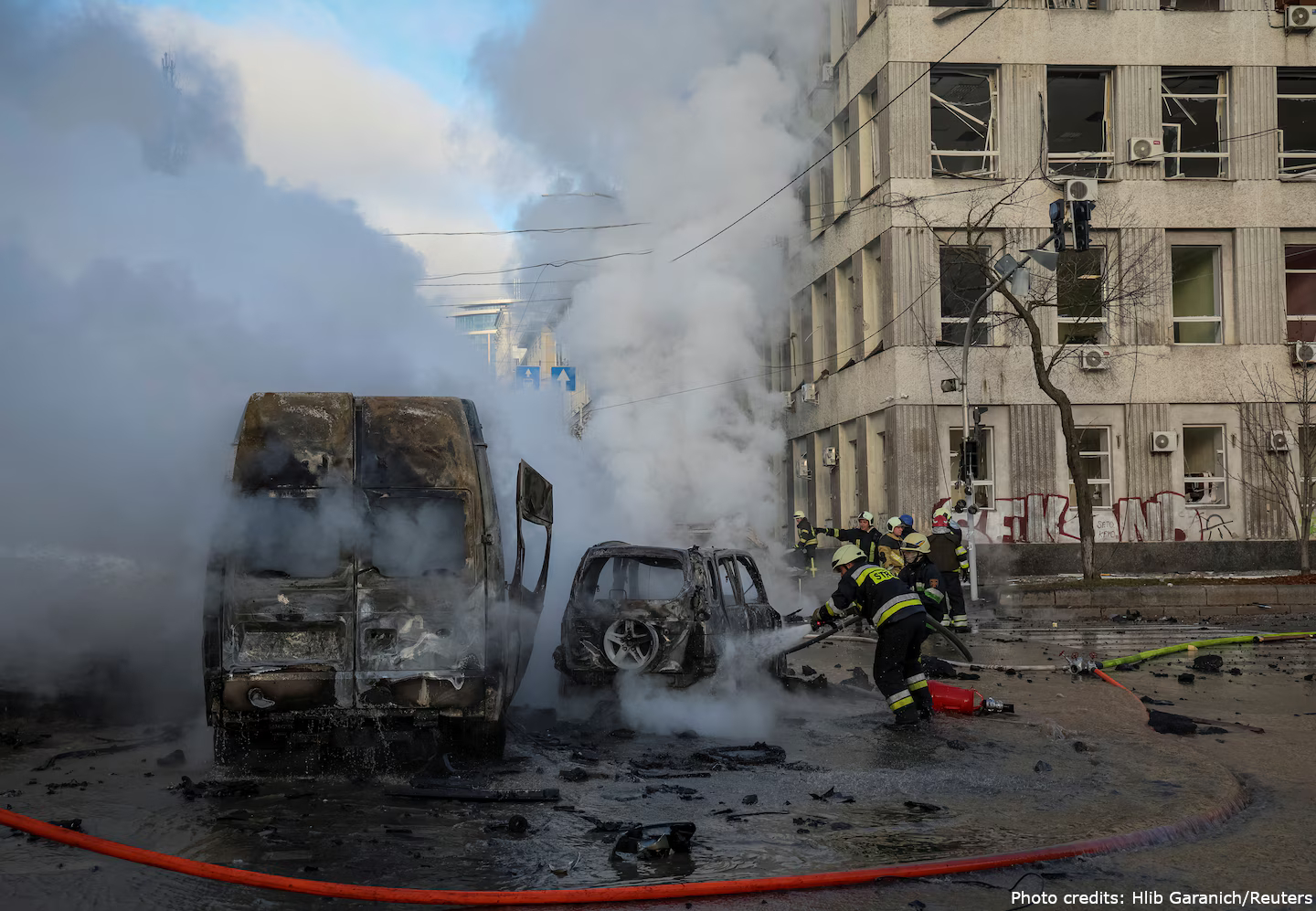 Firefighters work at the site of the Russian missile strike that killed Oksana Leontieva in her car in Kyiv on October 10, 2022
Firefighters work at the site of the Russian missile strike that killed Oksana Leontieva in her car in Kyiv on October 10, 2022In the months that followed, frequent power outages lasting up to several days resulted in lights shutting off in all departments but intensive care. These energy cuts jeopardized patient health by:
- Interrupting or delaying surgeries;
- Compelling surgeons to operate in darkness using only headlamps;
- Stopping water flow to the hospital, creating unhygienic conditions;
- Rendering diagnostic and treatment equipment unusable.
Physicians for Human Rights and Truth Hounds stated that the Russian Federation must immediately cease its aggression and stop attacking health care workers and facilities, targeting energy infrastructure essential to civilian life, and refrain from indiscriminate attacks that endanger both health and civilian energy systems.
“You can work in this mode for a couple of years, but not forever. […] For me, Okhmatdyt was a fortress. I thought a children’s hospital wouldn’t get hit”, Dr. Lesia Lysytsia, a pediatric ophthalmological surgeon, reflected.
On July 8, 2024, a Russian missile hit the hospital’s toxicology building, killing two civilians, injuring 50 others, and knocking out power and water in the hospital.
“It was dark and dusty,” she remembers, hearing “beeping devices, signaling errors [and] the screams of children,” Dr. Anastasiia Zakharova, a pediatrician and department head at Okhmatdyt, recalls.
Her colleague, Dr. Svitlana Lukyanchuk, did not survive the impact. The hospital was left non-functional, with temporary power generation systems taking days to restore services.
Similarly, the Mariupol Regional Intensive Care Hospital has also faced challenges after the full-scale invasion. In February and March 2022, the hospital endured several direct attacks during the assault on Mariupol, while the siege cut off its power. The hospital was later occupied by Russian forces and turned into a military base. By December 2022, the hospital had relocated to Kyiv with the help of medical personnel who evacuated from Mariupol.
Even in its new location, the hospital’s functionality is often limited due to ongoing attacks on energy infrastructure. Dr. Olena Lazarieva, an intensive care anesthesiologist, described how the hospital faces frequent blackouts:
“Sometimes during my 16-hour shift, the power was on for 40 minutes, sometimes for an hour and a half,” she reported.
Without electricity, surgeries are postponed, and lifesaving equipment is at risk of failing:
“If there are severe patients, if they need oxygen, artificial lung ventilation, without electricity, it can be bad,” Dr. Lazarieva said.
“When you hear an [air raid] alarm, you immediately think what to do – whether there will be a power outage, whether the oxygen station will work, what to do next during the surgery”.
Physicians report that patients experience panic attacks and cardiac arrhythmia due to lack of power and face delays in surgery and other essential health care.
A survey of 2,261 health care workers conducted as part of this research project indicates that the experiences of clinicians in Mariupol and Okhmatdyt hospitals are far from unique. Key findings from the survey include:
- The overwhelming majority (92.3%) of health care workers report experiencing power outages at their health facility as a result of attacks on energy infrastructure.
- Two-thirds of health care workers (66.3% ) reported that power outages due to attacks on energy infrastructure affected medical procedures in their facilities.
- Specifically, 8.4% noted delays in elective surgeries, 1.7% experienced interruptions during surgery, and 1.8% reported failures in life support systems due to outages.
- Outages disrupted communication systems (35.7%), water supply (21.5%), heating and ventilation (19%), and elevators (16.5%).
- 7.8% of respondents noted malfunctions in diagnostic equipment, such as X-ray machines and MRIs due to outages.
Medication storage issues, leading to spoilage, were reported by 13.8%, and 3.6% informed about problems with storing biological samples like blood or embryos. - Permanent health harms (36 reports) and deaths (20 reports) were also reported.
82.9% of health workers experienced increased stress, burnout, and other challenges due to these attacks on energy infrastructure and disruption of services, with 27% facing these hardships daily.
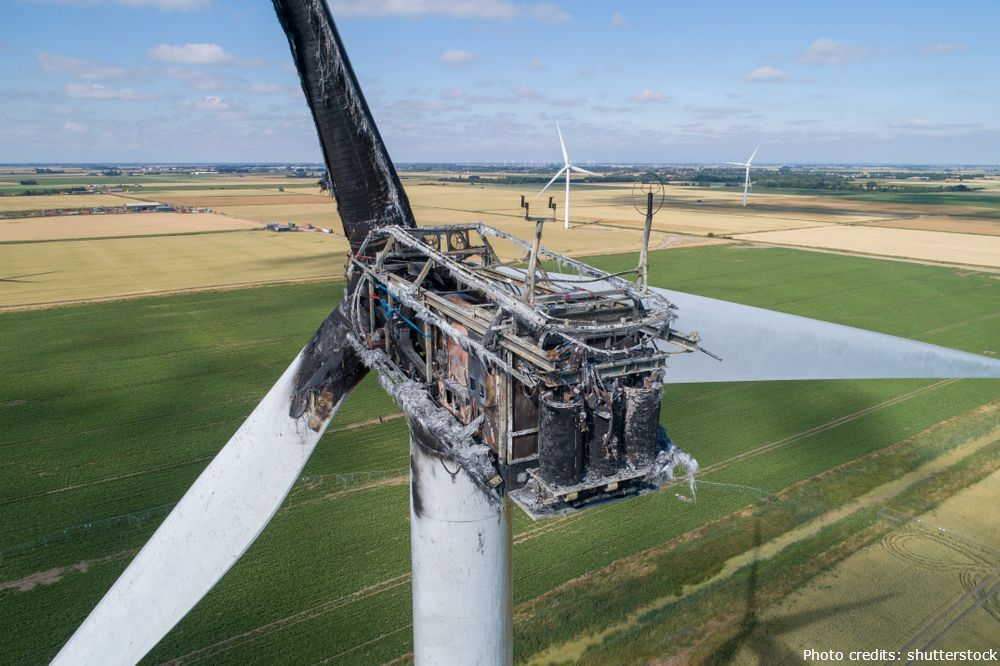 Damaged wind power plant
Damaged wind power plantHuman rights organisations highlighted that preliminary analysis suggests that these attacks may constitute violations of international law, including the laws of war and the human rights to life and health, and in some cases may give rise to criminal culpability as a matter of international criminal law.
Accountability is crucial to deter future violations, uphold legal obligations, and provide justice and reparations for survivors. Immediate action is needed to investigate these attacks, support Ukraine’s health care system, and ensure the long-term recovery of critical infrastructure.
The Ministry of Health of Ukraine also reported that as of the end of December 2024, since the beginning of the full-scale war, Russian forces have damaged 1938 facilities in 715 healthcare institutions in Ukraine and completely destroyed 297 facilities in 114 hospitals.
“PHR” and “TH” also made the following recommendations:
To prosecutors and investigative bodies:
- Focus investigations on attacks on energy and health infrastructure as war crimes and crimes against humanity, ensuring integration of cases and collaboration between national and international teams.
- Dedicate resources to building cases of harm to the health care system and preserving evidence for future legal use.
To the government of Ukraine:
- Implement legal and policy measures to ensure that attacks on energy and health care are fully documented and investigated.
- Fully document health impacts and support affected patients and health care facilities, including providing mental health assistance.
To the international community:
- Increase the support to Ukrainian health care facilities to respond to their critical needs.
- Publicly denounce attacks on health and energy infrastructure and advocate for their immediate cessation.
- Enhance enforcement of international norms protecting health care and civilian infrastructure, support accountability mechanisms, and condemn arms sales violating UN resolutions.
- Improve data collection and sharing on attacks impacting health and energy services.
- Strengthen cooperation with non-governmental organizations (NGOs) and national health agencies to improve documentation as well as resilience of health care facilities affected by prolonged power outages.
By way of background, at the OSCE Human Dimension Implementation Meeting in Warsaw on October 9, 2024, Crimean Human Rights Group (CHRG) researcher Iryna Siedova warned that Russian media has become a “Thousand Hills Radio,” manipulating 140 million people and inciting violence against Ukrainians. The CHRG advocates for new international legislation against genocide incitement.
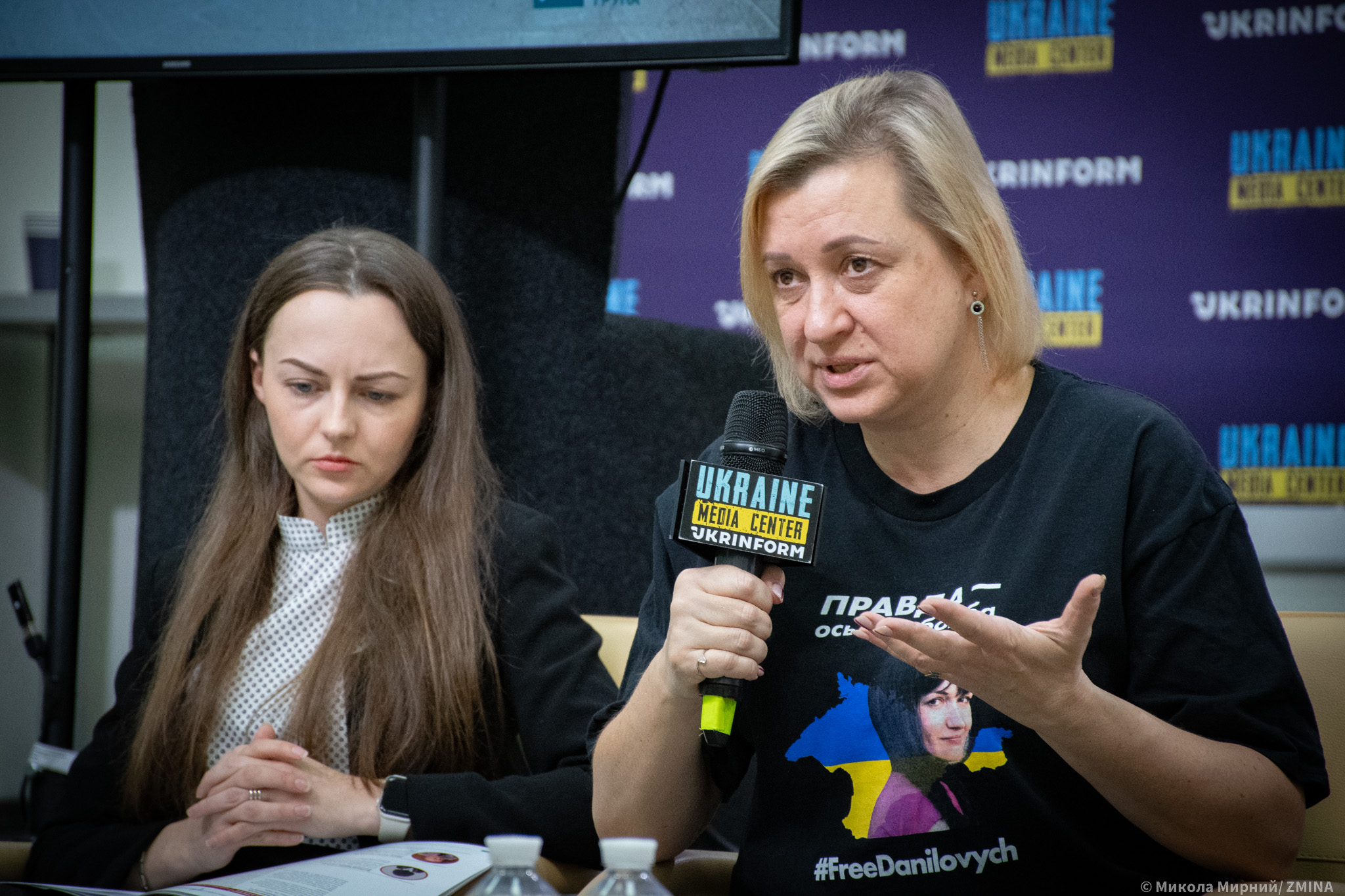 Iryna Siedova
Iryna SiedovaWhen speaking of effectively countering the spread of such calls, Siedova stressed the need to carefully study and develop new legal mechanisms to influence the owners of social media platforms and messengers that currently facilitate the global spread of this dangerous content.
Previously, the Deputy Head of the Office of the President, Iryna Mudra, pointed out that international partners praise Ukraine’s efforts to reform its justice system despite the war, but these partners have not taken tangible action to reform global justice.


